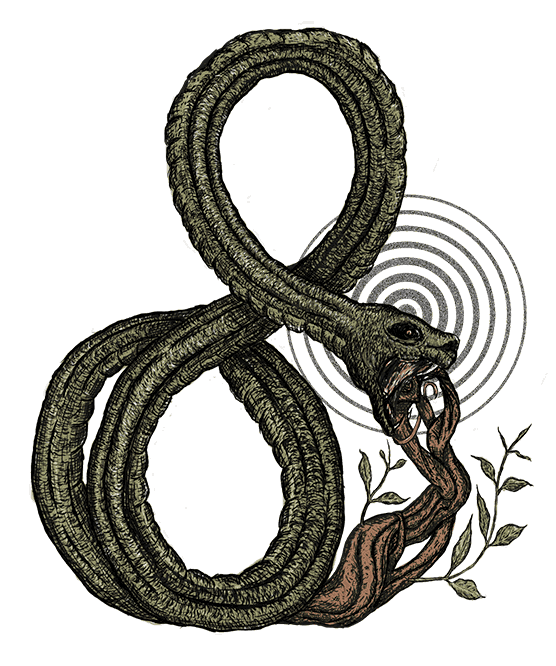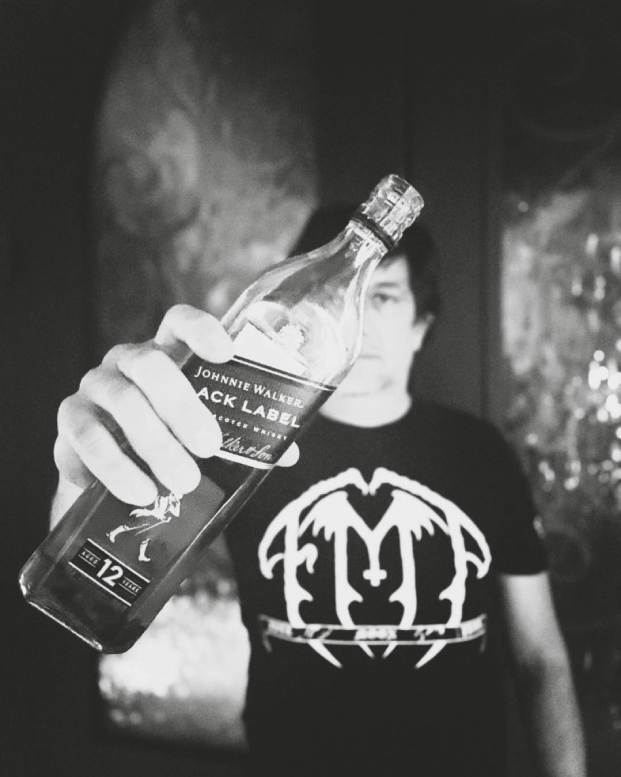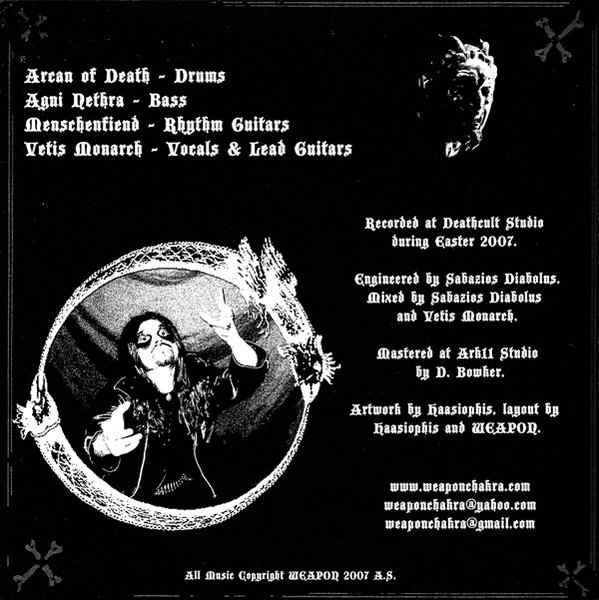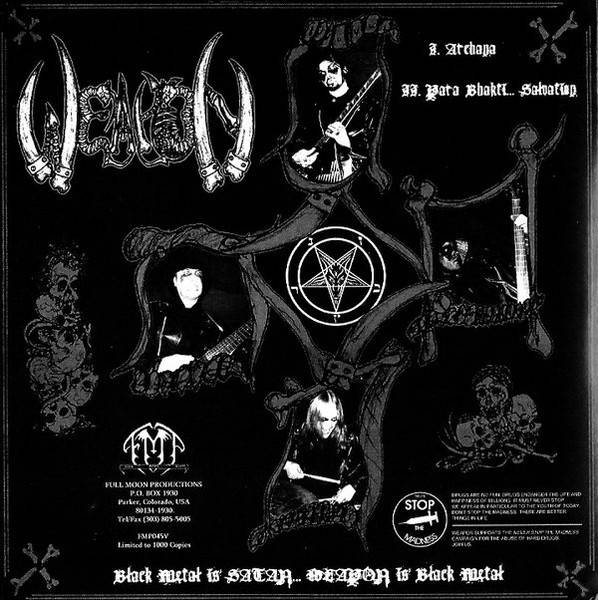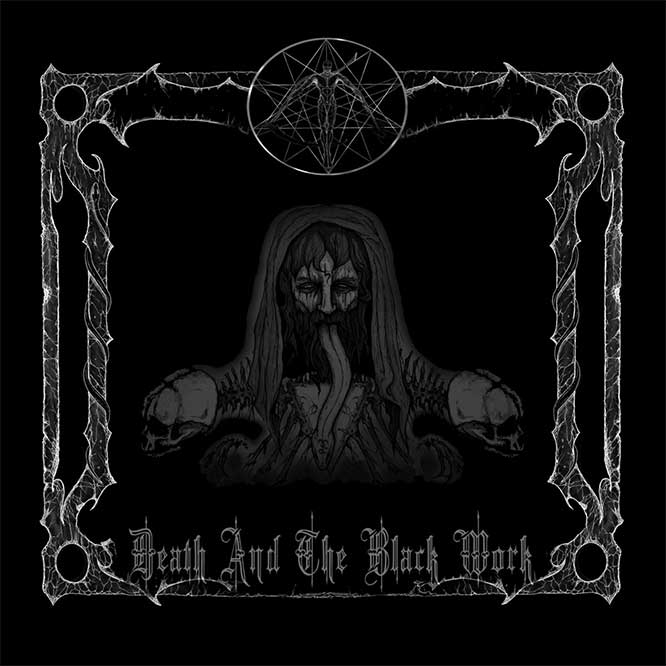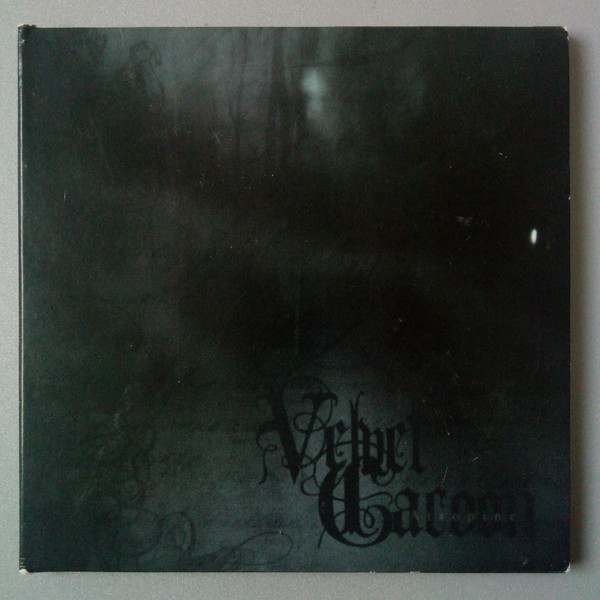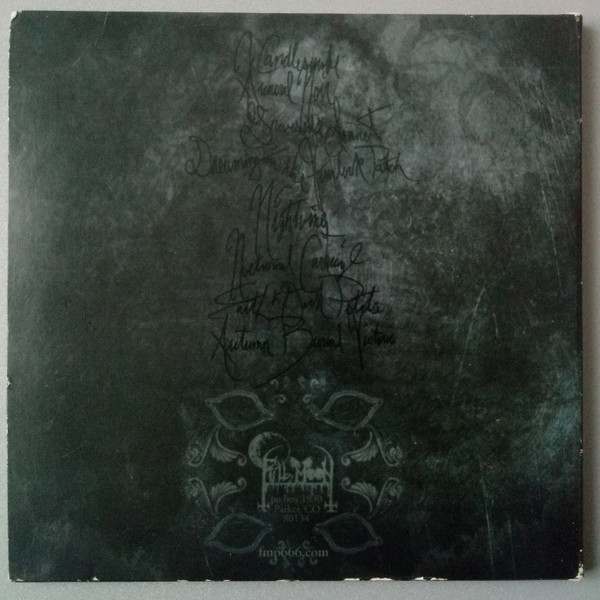Full Moon Productions IX
2025-09-24
by Niklas Göransson
As debts mounted and momentum drained, Jon Jamshid fought to keep Full Moon Productions alive. But after two decades of defiance, he chose to end it on his own terms: no farewell, no compromise, only the certainty that the flame had run its course.

JON JAMSHID: When F.M.P. started, we were basically the only US outlet selling black metal. By the mid-2000s, you had hundreds of distros competing against each other. Meanwhile, the aftershocks of 9/11 lingered for years as we got entangled in a legal dispute with our main distributor.
After 9/11, many independent record shops – already buckling under chain outlets, mail-order distros, and online piracy – were crushed by the subsequent recession. The ensuing mass demise of physical stores had a ripple effect throughout the entire supply chain; Dutch East India, Jon’s retail distributor, shut its doors with thousands of F.M.P. records still inside.
JON: Our lawsuit dragged on three or four years – and when we finally won, I was thrilled… until I realised we wouldn’t see a cent. They’d scammed around a hundred labels, and when it came time to pay, the bigger ones went first. We were at the bottom of the list, so F.M.P. got nothing.
After Dutch East India’s bankruptcy, the trustee dumped all F.M.P. stock – offloading records for as little as a dollar, sometimes fifty cents.
JON: We couldn’t even sell our own titles without competing against F.M.P. back stock being liquidated at a loss. It undercut us completely and drained my finances, which meant I couldn’t release new material. Revenue shrank to a trickle from the little stock we still had – just enough to keep us afloat.
Salvation came in unexpected form: VELVET CACOON’s “Genevieve: December Star Embassy Vol. II”. The 2004 album sparked uproar – wild rumours, suspected background fabrications, outright plagiarism scandals – but also plenty of adoration. The controversy only fuelled demand, making it F.M.P.’s best-selling release of all time.
Unlike most bands, VELVET CACOON delivered finished masters and layouts at no studio cost and even waived royalties, leaving Jon with virtually risk-free revenue when the label needed it most.
JON: Here’s something you might not have considered: “Genevieve…” didn’t do well inside the black metal scene. It was never embraced there. Instead, interest came from outside – hipsters, punks, people into eclectic or experimental music. They were the ones buying VELVET CACOON.
Meaning, precisely what you were hoping for with WILLOW WISP?
JON: Exactly. And think about how convoluted and fucked up this is – I want you to picture it. I didn’t want to profit off black metal because staying pure mattered to me. Yet it felt perfectly fine to tap into another crowd and funnel that money back to F.M.P. Hipsters by the thousands buying VELVET CACOON? Great!
So, what you’re saying is that F.M.P. is partly to blame for the black metal hipster influx of the mid-2000s?
JON: <laughs> Maybe. I earned from a different audience and reinvested in black metal. That split allowed it to make sense to me. In hindsight, I probably should’ve released VELVET CACOON through a different label altogether, so people could see it as separate from what F.M.P. stood for. The black metal crowd turned their backs on it completely – they wanted no part of VELVET CACOON.
In June 2007, by popular demand, Southern Lord licensed both VELVET CACOON’s “Genevieve…” and “Northsuite” from F.M.P. for vinyl release. But as coveted as these LP editions might’ve been, they were arguably overshadowed by one of the most iconic Full Moon releases of all time, unveiled the same month: the ‘Do Not Believe it Comrade’ clothing line.
JON: That catchphrase started on the F.M.P. forum and became a classic overnight. People were throwing around ‘Believe it, comrade’ and ‘Don’t believe it, comrade’ in every email, every letter – even when phoning in orders. It was fucking ridiculous, honestly. I don’t even remember who said it first.
With my own memory failing, I made some enquiries. Neill Jameson of KRIEG – who was an F.M.P. forum moderator for several years – suggested it originated from someone affiliated with Drakkar Productions but couldn’t say for sure. Both Jon and I are curious; if anyone reading this remembers, feel free to let us know.
JON: Regardless, it stuck as a forum slogan, which both J.B. and I found hilarious. Someone eventually suggested official F.M.P. merch – ‘Do Not Believe it, Comrade’ on the front, ‘Believe it, Comrade’ on the back <laughs>. We printed a hundred shirts, and they sold out right away.
Jon channelled all revenue from the VELVET CACOON licences and DNBiC merchandise into releases more aligned with his vision. A significant portion of the earnings funded reissues of three classic ARCKANUM albums originally released by Necropolis Records: “Fran Marder”, “Kostogher”, and “Kampen”.
JON: Those reissues were another attempt at reviving F.M.P., but it turned into a mess. Implosion – the Orlando company handling our CD and booklet printing – went out of business mid-process, and the ARCKANUM albums ended up their final batch.
By then, Jon had already wired payment for all three – and when a company folds, there are no reimbursements. He had to scrape together more money to reprint elsewhere, so all three releases cost twice as much due to the lost first run. And the mishaps didn’t end there.
JON: Shamaatae (ARCKANUM) provided what he claimed were print-ready CDs. When we received them, they weren’t properly mastered – just WAV files, not production-ready audio. Instead of sending new files, Shamaatae told us to convert them ourselves. We did… but it introduced small gaps between tracks. He wasn’t happy with the result, so we stopped pressing the CDs.
That same year, Full Moon Productions released “Para Bhakti… Salvation” – a seven-inch EP by Canadian black/death band WEAPON. Perhaps most notable here is the label’s return to vinyl.
JON: Part of me thought, ‘Alright, maybe F.M.P. should evolve a little – let’s experiment with vinyl. No reissues, just new material.’ At the same time, I had serious reservations. Back then, the LP format was only just starting to come back.
Between 2006 and 2007, US vinyl album sales jumped by nearly eighty-six percent, while compact discs fell by almost twelve.
JON: There were no guarantees you’d sell what you pressed. If I printed a thousand CDs, I knew I could move them. CDs were dirt-cheap to make; LPs had a profit margin of maybe fifty cents to a dollar per copy. From a business standpoint, vinyl made no sense to me.
Wasn’t J.B. pushing for this?
JON: Oh yes, J.B. and others tried to convince me vinyl was the way forward, but I just couldn’t commit. Other labels were already doing well with their diehard editions. Yosuke (Nuclear War Now!) told me they were killing it and urged me to get on board.
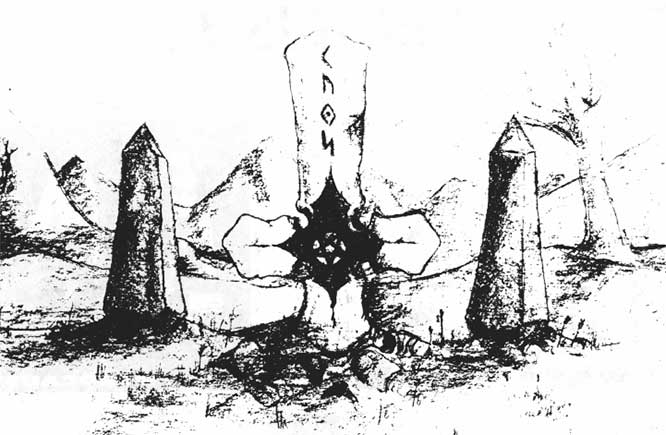
When Jon moved to Colorado in 2006, he arrived full of ambition and grand ideas about how to revitalise the label– none of which came to fruition. Instead, mail-order sales sagged month by month. Out of necessity, F.M.P. shifted toward distribution and managing the back catalogue rather than signing new acts.
By early 2008, F.M.P. had sold out of all remaining CD stock of VELVET CACOON’s “Genevieve…”. Rather than an in-house re-issue, Jon licensed it to Southern Lord. With compact discs ‘dirt cheap’ to produce, and an identifiable demand, I can’t make sense of this decision.
JON: You know as well as I do – “Genevieve…”, or VELVET CACOON in general, isn’t real black metal. It was a strange release for F.M.P. from the beginning. At that point, washing my hands of the whole thing and walking away – with a decent cash infusion, mind you – felt like the principled choice.
How much did these licensing arrangements extend F.M.P.’s lifespan?
JON: Enough to keep us going longer than expected. Actually, Southern Lord were going to pay royalties, and I said, ‘Send those directly to the band.’ Josh Lobb (VELVET CACOON) reached out immediately: ‘We don’t want any money. Everything belongs to F.M.P.’ Bizarre behaviour. But yeah, I’d say it bought us about two more years.
Both Neill Jameson – who ran Blood, Fire, Death – and Tyler Davis of The Ajna Offensive have noted that the sudden interest in black metal from hipster-adjacent labels left a sour taste.
Nevertheless, when Tyler tried to secure US distribution for NoEvDia, he struck a deal with Southern Lord. It didn’t last long, as they found the title of KATHARSIS’ “Fourth Reich” unacceptable, and the agreement fell apart.
JON: By the time Southern Lord came sniffing around, I’d already seen that cycle play out a hundred times. The damage was done. Ever since that Century Black shit in the mid-’90s, I’d watched waves of labels launch black metal offshoots to cash in on bigger names. The whole thing felt like a farce.
In December 2008, Full Moon Productions released NIGHTBRINGER’s “Death and the Black Work” – the culmination of a process that had been ongoing for more than three years.
JON: J.B. handled NIGHTBRINGER directly, but we’d have regular meetings to track progress. From memory, that recording process was rocky from start to finish, so I felt real relief when the final mix landed. Plus, the album sounded fucking incredible – we had high hopes.
The delays stemmed from circumstance as much as ambition. Technical setbacks piled on: the hard drive of Flatline Audio crashed, wiping out all progress. Then, thieves robbed the Denver studio, stealing ADATs containing the re-recordings. Between rebuilding sessions, limited funds, and youthful ideas like recording in the woods, they had to start over multiple times.
What finally emerged in 2008 was persistence forged through years of adversity. Fittingly, additional turmoil hit just before its release.
JON: Apparently, a band member had shared an advance with someone, and it leaked online. So here we were, awaiting this major, groundbreaking F.M.P. release… and now anyone could download it from one of those goddamn torrent sites.
For context, torrent sites are online platforms built around peer-to-peer file sharing. Instead of downloading an album from a single server, users trade fragments directly with each other.
JON: I fought back my way: I took ten random tracks, labelled them with NIGHTBRINGER and the album title, and uploaded a fake torrent. Within a week, the fucking thing had 10,000 downloads from people who thought they were getting “Death and the Black Work”.
More than expected, I presume?
JON: I was straight-up shocked. I told J.B., ‘We’re about to release a highly anticipated album, and barely any pre-orders are coming in. Meanwhile, the digital version has already been downloaded thousands of times. If that’s what lies ahead, this is where it ends.’
Meanwhile, buzz built around the upcoming VELVET CACOON album, “Atropine”, announced on fmp666.com during the spring of 2008 as finished, mixed, and mastered. This was equally puzzling to me, given how Jon passed on the “Genevieve…” reissues.
JON: When F.M.P. signed VELVET CACOON, our deal was for three albums. Verbal agreement or not, I’ve always honoured my word, so I stuck to it – even though I felt over the whole thing. If I recall, we got the master, but I didn’t have the funds to move forward right away.
Instead, it took Jon seventeen months to save up enough money to cover the pressing cost.
JON: That felt as shameful as it was frustrating. Since the HADES debut, F.M.P. had always been self-sustaining – one release funding the next. But with most of our cash flow dried up, I had to work outside the label and funnel the money back in, trying yet again to breathe life into it.
“Atropine” finally appeared in September 2009 as a double-CD. Alas, it did not provide the financial relief Jon was hoping for.
JON: I could only afford a thousand copies – but even those didn’t sell out. Honestly, the only release of theirs that mattered, impact-wise, was “Genevieve…”. The rest weren’t anything special.
Part of the tepid reception likely came down to the complete absence of black metal – or any metal – replaced by two hours of droning, minimalist ambient consisting of pitched-down material stolen from other artists.
JON: I was completely unaware. By that point, nothing surprised me anymore. Everyone kept going on about how VELVET CACOON plagiarised music and pulled all sorts of crazy stunts. I don’t even know to what extent the band really existed; I’d always been told they had three or four members, but it might’ve just been Josh Lobb the entire time.

In conjunction with the “Atropine” release, fmp666.com announced that, after months of near-dormancy, the label’s mail-order had begun stocking new merchandise.
JON: We tried everything conceivable to save F.M.P. By then, we were no longer wholesaling – I got back into trading just to rebuild the mail-order catalogue, but it was too late. The customer base had thinned so much that whatever we offered wasn’t enough to pull people in.
Once you realised the inevitability of what lay ahead, was there a moment of outright panic or more of a slow, gnawing anxiety?
JON: Look, I’m a calculating, methodical person. I stay aware of what’s happening around me, especially when it comes to my own projects. So, no – no panic, no anxiety. I’d seen the writing on the wall, knew the ship was going down, and had come to terms with it.
log in to keep reading
The second half of this article is reserved for subscribers of the Bardo Methodology online archive. To keep reading, sign up or log in below.
